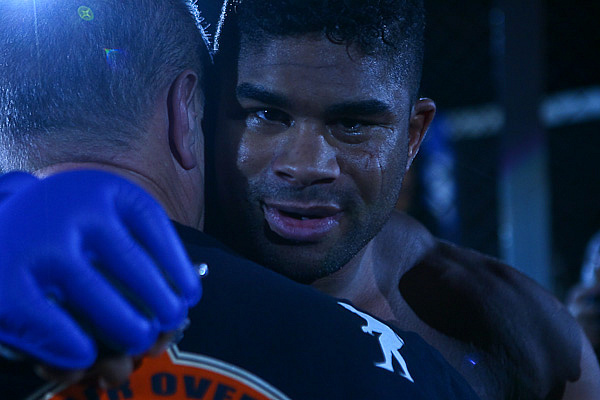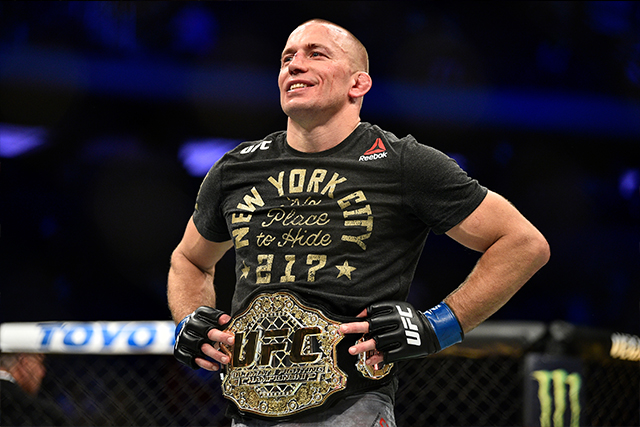Alistair Overeem and Japan’s Icon Architecture
Treasure Hunting
Tony Loiseleur Dec 30, 2010

Alistair Overeem | Daniel Herbertson/Sherdog.com
However, when the ratings come in for the Grand Prix broadcast, there is some disappointment.
The tape-delayed broadcast of the K-1 World Grand Prix scores a 13.0 on Fuji TV. The night’s king was the 2010 World Figure Skating Finals on rival station TV Asahi, which started two hours prior to K-1 and averaged a muscular 22.9 percent rating. Interestingly enough, figure skating was one of the major TV successors to combat sports circa 2006-07, when Japan’s kakutogi boom died. Head-to-head, Asahi’s “Saturday Night at the Mysteries Theatre,” a series running since 1977, bested K-1, notching a 15.8 in the same time slot.
Advertisement
Overeem will take on UFC veteran Todd Duffee at “K-1 Dynamite: The Power of Courage 2010” on New Year’s Eve -- the biggest night of the year for the company, in particular, and Japan’s fight scene, in general. Though the event will air on Fuji TV’s rival, the Tokyo Broadcasting System, the network knows that a successful, widely viewed New Year’s Eve bout for Overeem is crucial for it, as well.
And so, it’s time for the variety show circuit.
Treasure Hunting
This means more television taping, bringing us to Fuji TV headquarters, located on the leisure island of Odaiba in Tokyo Bay. The guts of Fuji TV are a labyrinth of sprawling gray hallways and fluorescent lighting. It’s a stark contrast to the loud, Technicolor brilliance of its TV sets.
As we are guided through the maze of nondescript halls and otherwise mysterious unmarked doors, Overeem hands me his World Grand Prix title belt and charges me with the price of admission for the day: a job as temporary belt boy.
“Watch this belt and don’t let anything happen to it,” he sternly commands.
File Photo
Overeem will take on UFC vet
Duffee (above) on New Year's Eve.
I engage Boon in a long conversation on his master plan of building Alistair into an international star. Boon tells me Overeem is in a “get big in Japan” phase. They do all they can to get him on TV and have him meet a who’s who of Japanese media moguls and celebs to ensure his ubiquity in the country for years to come.
“A few years ago, Alistair sat down with me and said, ‘These are my goals. I want to do things like fight in Japan this often, get titles, and retire at this age.’” Boon tells me. “So I developed a plan to do all of it. I can make it happen because of the network I’ve developed over the years.”
Boon has signed Overeem with Yoshimoto Kogyo -- one of nation’s oldest and most powerful talent agencies. Though Yoshimoto has historically managed the armies of comedians ever-present on Japanese television, its sheer size and reach has seen it extend its promotional efforts to athletes, musicians and actors, as well. Overeem is the company’s first foreign athlete in its nearly 100-year history.
Boon acquired these capabilities by spending more than two decades in the fight game as a producer, promoter and manager. Hemmers himself used to train and manage his stepson, Dutch kickboxing legend Ramon Dekkers, among many other Dutch fighters. A lot of history and ability exists between the two of them, and now Overeem benefits from their combined efforts. However, a media push of this magnitude for one of their charges is a new experience for both of them.
Today, Overeem is filming Fuji TV’s “Junk Cup,” a variety show in which various athletes compete in whimsical and ultimately pointless games. However, Boon takes Overeem’s participation seriously; it is competition, after all.
“Get your team to all head for one lever at a time, all together,” Boon instructs Overeem in Dutch before the game.
In this game, opposing teams of three are strapped into harnesses linked by strong elastic bands. The teams are then set back-to-back at the center of a large, matted circle. At the sound of a buzzer, both teams dash in opposite directions, scrambling to reach three levers at the end of their side of the mat. Whichever team overcomes the pull of its opponents to throw all three of its levers wins.
Representing the K-1 contingent are Overeem, Singh “Heart” Jaideep and Kyotaro Fujimoto. The judo team -- which features Olympic silver medalists and MMA fighters Naoya Ogawa and Hiroshi Izumi -- falls first to the professional baseball team, thanks to their lack of explosive speed and their restrictive judo uniforms. The professional wrestling team, led by Pride Fighting Championships veteran Yoshihiro Takayama, falls next to the American football team due to their inability to choose and drive in a single direction as a team. The sumo team uses brute strength to drag the baseball team to its defeat soon after.
When the K-1 team meets the footballers, Overeem throws the first lever by exploding into a sprint from the opening buzzer. However, his teammates are unable to hold ground the way the footballers can. Kyotaro spends more time being the class clown by flashing peace signs and smiling at the camera than he does trying to help Overeem or Singh reach the levers.
It is a Japanese variety show game, perhaps the summit of purposelessness. Yet, Overeem tries to win. He appears to be the only one trying to do so.
Though his team was defeated in its first and only round, Overeem beams with excitement afterward. Having worked up a light sweat in completing his TV duties for the day, he quickly makes his way through Fuji TV’s gray halls back to his dressing room to change quickly for his next appointment.
“After this, we have a dinner appointment with one of Japan’s biggest baseball stars, followed by a meeting with a film producer. I expect we’ll get done by midnight,” Boon tells me. It is just 7:30 p.m.
“Today sounds like an exceptionally busy day,” I reply, surprised.
“Not just today,” Boon says with a laugh. “It’s been like this for the last eight days, since the grand prix. He’s back in MMA training now, but he’s still doing this much media because he’s smart and he understands its importance. He’s a professional now.”
From the dressing room, Overeem begins humming a short tune while pulling on his jacket and shoes, after which he playfully says something in Dutch. I look at him, puzzled, hopeful in awaiting an explanation. As we leave Fuji TV for the parking lot where he will be chauffeured to his next meeting, he explains it to me.
“We have this saying in Dutch,” he says. “Basically, it’s ‘Who wants to make money? I do.’”
I am not sure whether he is joking. While I cannot tell for sure if it’s a real Dutch saying, I am certain it is Overeem’s personal maxim.
Related Articles







